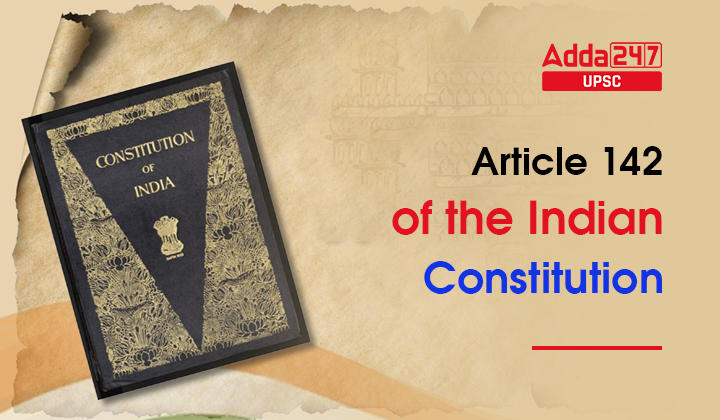Table of Contents
Article 142 of the Indian Constitution grants special powers to the Supreme Court of India in the exercise of its jurisdiction. The first paragraph of Article 142 states that the Supreme Court, in the exercise of its jurisdiction, may pass any decree, order, or judgment necessary for doing complete justice in any cause or matter pending before it.
This means that the Supreme Court has the power to take any action that is necessary to provide complete justice in a case, even if it is not explicitly authorized by law or procedure. The court’s power under Article 142 is discretionary and can be exercised sparingly and cautiously.
What is Article 142?
Article 142 of the Indian Constitution is a provision that grants special powers to the Supreme Court of India in the exercise of its jurisdiction. The article gives the Supreme Court the power to pass any decree, order, or judgment necessary for doing complete justice in any cause or matter pending before it.
The first paragraph of Article 142 states that the Supreme Court, in the exercise of its jurisdiction, may pass any order or decree that is necessary for providing complete justice in a case, even if such an order is not within the scope of the existing laws or procedures. This means that the court can use its discretion to take any action it deems fit to ensure that justice is served in a case.
The power conferred by Article 142 is discretionary and must be exercised with caution and circumspection. The court must ensure that it does not overstep its jurisdiction or violate any fundamental rights while using its powers under this provision.
What is the History of Article 142
The history of Article 142 of the Indian Constitution can be traced back to the Constituent Assembly debates. The framers of the Constitution recognized the need for the judiciary to have certain discretionary powers to ensure justice in cases where the existing laws or procedures were inadequate.
The original draft of the Constitution did not contain any provision similar to Article 142. However, during the debates, Dr. B.R. Ambedkar proposed an amendment to include a provision that would give the Supreme Court the power to pass any order necessary for doing complete justice in any cause or matter pending before it.
The proposal was accepted and Article 142 was added to the Constitution. The provision was modeled on a similar provision in the Government of India Act, of 1935, which granted similar powers to the Federal Court of India.
Over the years, the Supreme Court has used its powers under Article 142 to provide relief in cases where the existing laws or procedures were inadequate. The court has used this provision to grant compensation, order investigations, and even issue directions to government authorities.
However, the court has also been cautious in its use of this power, recognizing that it must be used sparingly and only in cases where it is necessary to provide complete justice.
Advantage of Article 142
- Article 142 empowers the Supreme Court to pass any order necessary to provide complete justice in a case, even if such an order is not within the scope of existing laws or procedures.
- It allows the court to tailor solutions that are best suited to the specific facts of a case, providing relief to parties that may not have been available otherwise.
Article 142 can help reduce the burden on the already overloaded legal system by allowing the court to pass orders that do not require lengthy and complicated legal procedures. - It can help ensure that justice is served in cases where existing laws or procedures are inadequate.
- Article 142 gives the Supreme Court the power to issue directions to government authorities, ensuring that court orders are implemented effectively and providing relief to the parties involved.
- The provision is used sparingly and only in cases where it is necessary to provide complete justice, which ensures that the court does not overstep its jurisdiction or violate fundamental rights.
Overall, Article 142 plays a crucial role in ensuring that justice is done in cases where existing laws or procedures are inadequate, and its discretionary powers allow the Supreme Court to address any gaps or inconsistencies in the law.
Disadvantage of Article 142
- Article 142 gives the Supreme Court broad discretionary powers, which could potentially be misused or abused by the court.
- The use of Article 142 may lead to inconsistent or unpredictable outcomes, as the court has the power to pass any order necessary for providing complete justice, even if it is not in line with existing laws or procedures.
- The discretionary nature of Article 142 means that it can be difficult to predict the outcome of a case, which can lead to uncertainty and inconsistency in the legal system.
- The use of Article 142 may lead to the erosion of the separation of powers between the judiciary and the executive, as the court can issue directions to government authorities.
- Some legal experts argue that Article 142 undermines the rule of law, as it allows the court to bypass existing laws and procedures.
- The use of Article 142 could potentially lead to judicial activism, where the court takes on a more active role in shaping policy and governance, which may not be desirable in a democratic society.



 TSPSC Group 1 Question Paper 2024, Downl...
TSPSC Group 1 Question Paper 2024, Downl...
 TSPSC Group 1 Answer key 2024 Out, Downl...
TSPSC Group 1 Answer key 2024 Out, Downl...
 UPSC Prelims 2024 Question Paper, Downlo...
UPSC Prelims 2024 Question Paper, Downlo...
